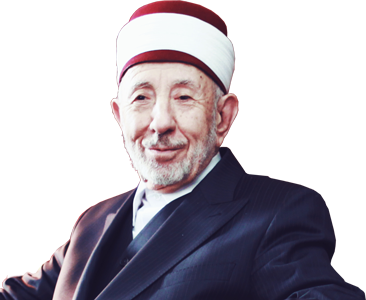
العلّامة الشهيد محمد سعيد رمضان البوطي


الفتوى رقم #questions_about_theology_part_one
Questions about Theology (Part One)
السؤال
Dear Dr Muḥammad Saʿīd Ramaḍān al-Būṭī, I have tried many times to sit down with you one-on-one or in private in order to shower you with my questions. Even though they are not that many, I am sure that answering them will take some time. They are as follows:
- What is the ruling for someone who was born in a western country, in a remote place, and never heard about Islam at all (as was the case in the previous century) and when he did hear about it, all he heard about was the terrorism and crimes committed by its adherents, along with their backwardness (regardless of the veracity of what he heard), and then died upon that?
- If you or I were born in a remote land, and I was born a Christian, for example, or a Jew, into a religious, conservative, respectable family that is proud of their religion (as is the case with any Muslim here), what would make me think about changing my religion? If that happened and I thought about changing my religion (and this is extremely difficult), would I choose Islam first? What about Buddhism, which encourages nobility, trustworthiness, integrity, and so forth? Would I spend my life looking for the true religion? What if I started with Buddhism, for example, and became convinced of it? What would be the ruling for such a person?
- I was born a Muslim just as someone else was born a Christian or a Jew. Is it obligatory upon me to think about the veracity of my religion just as I demand the same of others?
- On the topic of Iblīs being expelled from the Paradise, how should I understand Iblīs’s situation, who saw the bliss of Paradise, which he will never see anything better than, and he also saw the horror and terror of the Fire, which he knows with certainty that he will be punished therein eternally, and eternity is a work that requires a lot of reflection to fully grasp its meaning? Then he persisted in his arrogance and stubbornness while knowing with certainty that he would soon be punished eternally. Is his desire to lead humanity astray out of revenge because of his own arrogance equivalent to what he will receive, and he knows best what he will receive? Any one of us can believe in the Paradise and its bliss and believe in the Fire and its punishment without seeing either of them, so what about someone who has seen them? If Allah so wills, my question is not blasphemous. I am just trying to understand.
- When I think about the word ‘eternal’ (khālid) with regards to the Fire, I do not think it is a suitable punishment for anything done in this worldly life, no matter how bad it may be. The person who commits the most horrific crimes in the world may be sentenced to thousands of years of punishment, or hundreds of thousands, or even millions, but is not Allah, Glorified is He, and He is more merciful than anyone who shows mercy and He is the creator of mercy, too merciful to punish someone timelessly, forever? Is there another understanding for the word khulūd (eternality) with regards to the Fire as mentioned in the Qurʾān?
- What is the difference between calling to Islam (ad-daʿwah) and evangelism (at-tabshīr)? Why does the Muslim have the right to do daʿwah while the Christian does not have the right to evangelise? In fact, he can be openly punished for doing so in most Islamic and Arab countries. Is this simply because evangelising can be done by alluring people with money, or is there another reason? What if the evangelising were free of monetary enticements? Would it be allowed just as ad-daʿwah is allowed?
The person who has not heard about Islam at all, or did hear about it was not granted the opportunity to learn the truth about it, or it reached him in other than its true form and he was not granted the opportunity to discover its true form, will not be held responsible and will not be punished on the Day of Standing. This because the Exalted One has said, “We never punish until We have sent a Messenger.” [al-Isrāʾ 17:15]
It is a matter of fact that thousands of young people in Europe and America, male and female, need to let their intellects decide which religion they should embrace. Then they should consider Islam by reading books and speaking to Muslims. Their intellects will show them the foolishness of their religious beliefs and how Islam’s doctrines and principles conform to what the intellect requires. They will then leave the religious vacuum that they grew up in in favour of the Islam that that their intellects have guided them to. Therefore, one’s intellect can guide one to the right path and protect one from baseless delusions. The environment one grows up in does not veil one’s intellect from thinking, comparing, and making a judgment.
Yes, a Muslim is obligated to think about the evidences for the veracity of his religion, and upon doing so his adherence to it should become firmer. If someone embraces Islam without his intellect comprehending the evidences for its veracity, both scientifically and logically, he is just a blind follower, and the Islam of a blind follower is not valid.
It is the nature of arrogance and oppression to lead a person to the same end that Iblīs came to, and the evidence for this is the state of arrogant people today. Through dialogue and discussion, they arrive at knowledge of the truth and it removes all their delusive arguments, but despite that, they will stubbornly cling to their position, preferring what their arrogance calls to over that which their intellect calls to. When Allah is angry with an arrogant person, He puts a veil between him and his intellect. Allah spoke the truth when He said, “I will divert from My signs all those who are arrogant in the earth without any right.” [al-Aʿrāf 7:146]
The eternal punishment of the Fire is not because of the evil deeds that stubborn deniers commit during their seventy or eighty years on earth, for example. Rather, it is because Allah knows they have made the firm resolution never to turn back from their disbelief and stubborn denial, regardless of how long they may live. You should know that the reward that Allah has stored up for His righteous slaves is only because of their firm resolutions and decisions, which were to remain adhering to the truth no matter how long they lived. (In the Qurʾān, resolve (al-ʿazm) is referred to by the word al-kasb (i.e. earning).) The punishment that Allah stored up for those who die upon stubborn denial is because of their resolve and decision, made in this life, never to leave disbelief and come to faith in Allah, no matter how long they live.
There is nothing in Islam that prohibits the People of the Book from declaring their religions and evangelising on their behalf, on the condition that in doing so they do not detract from Islam. Likewise, when calling to Islam, Muslims must not attack Christianity and detract from it, and this is in accordance with the well-known principle: a Christian is not tempted regarding his Christianity nor a Jew regarding his Judaism.